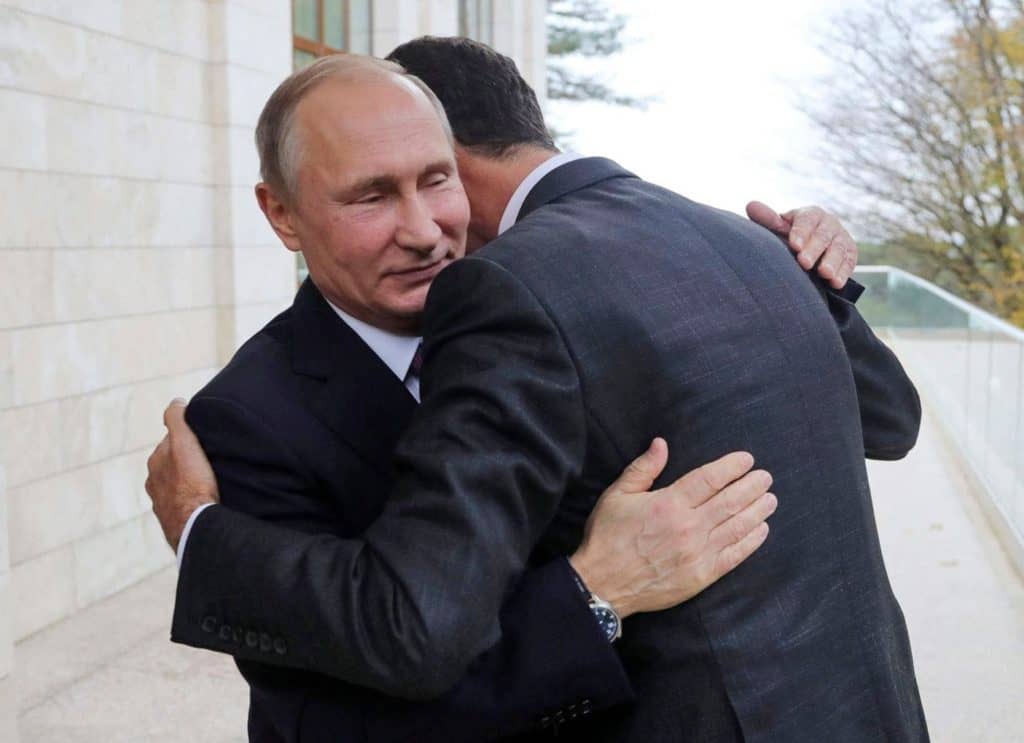After 8 years of continuous and intense fighting, many power struggles and international interests that finally dragged the US, Russia, China, Turkey, Iran, Israel, Iraq and other countries in the region into the war, the Syrian civil war seems to be – for the first time – coming to an end.
The stagnation of the peace talks and the frustration of the rebel proxies are producing a slow but steady capitulation to the victorious Bashar Al-Assad regime backed by the Russian Federation.
Trump’s arrival in power meant a drastic change in the previous US strategy implemented by Obama (or more realistically, by Hillary Clinton from the Secretary of State). The US ceased to openly support and finance the “Syrian rebels”, in the face of overwhelming evidence that the majority of the groups opposing the Assad regime were actually jihadists groups and collaborators of international terrorism. In other words, Trump gave way to Assad’s victory, as it is less expensive for US interests to keep a “dictator” in power than to risk Syria (neighbor of Israel and in the heart of the Near East) becoming in a new Afghanistan after the triumph of the rebels.
What changed?
The – indirect – end of the support of the US and the Arab Gulf countries (which were interested in overthrowing Assad, the main ally of Iran) meant an immediate military collapse for almost all the rebel strongholds in the country. The Assad government -militarily backed by the Russian army, the Revolutionary Guards of Iran and the Lebanese militia Hezbollah- managed to reconquer in a relatively fast manner almost all the provinces of the Syrian Arab Republic.
The rebel military collapse forced the opposition to sit at dialogue and negotiation tables for two years, while the Syrian regime and its allies still continued to advance and exert pressure over the Province of Idlib, considered the last bastion of rebel resistance against the president Assad.
The rebels surrounded in Idlib have no considerable external support, or any military strategy, to counterattack the Syrian army. The stagnation of the negotiations is producing a set of continuous surrenders by the fractured and defeated insurgency.
It is unlikely that there will be a diplomatic and negotiated exit for the Syrian Civil War, due to the lack of trust between both sides and the radicalization of both government and opposition positions. The Syrian regime continually accuses the rebel groups (many times with reason) of being terrorists, while the opposition engages in the absolute departure of Assad, and does not settle for other concessions.
It is worth to note the importance that Assad assumed: Syrian regime and the Russian propaganda have made him a figure of regional resistance to the imperialism. The continuation of the regime for Syria, Iran and Russia with any other face in the Executive Power would not make sense and it would be perceived as a defeat. As there is –almost- no possible solution via the diplomacy and dialogue, the de facto winning of Russia and its allies seems to be the end of the war.
The triumph of Russia and the reconfiguration of power in the Middle East
The Syrian Civil War is considered one of the most complex conflicts in the history of mankind. The overlap of many economic, political and religious interests dragged – directly and indirectly – into the war against most of the regional and world powers.
Russia is one of the main winners of the conflict on all fronts, and with very limited damage. The Russians supported their Arab allies to “resist” against Obama’s US-supported groups. In that way, the Russians project themselves as a power capable of providing “protection” against “US imperialism.” In addition, Assad’s stay in power guarantees the Russians a military stronghold in the Near East and the operation of the already existing naval bases on the coasts of the Syrian Mediterranean for at least the next 15 years. From an economic point of view, the Russians – like the Chinese and the Iranians – will undoubtedly have a good participation in the reconstruction of Syria.
The triumph of Assad is also a great relief for Iran, as the continuity of the Syrian regime allows the comfortable and direct connection of the Iranians with the Lebanese militia Hezbollah and the continuity of what they regard as the fight against international Zionism.
Another factor to consider is the new threat that hangs over the State of Israel. Over the past few years, the Hezbollah military group has been exposed to important battles and real fighting in Syria, which gives the group an invaluable experience that they will undoubtedly use to implement in the fighting south of the Lebanese border.
Assad’s victory represents a very strong political coup for the West. The same European countries that a few months ago proliferated in all the media that the end of the Assad regime is near, now they seek by all means an approach with Russia and the regime to try to safeguard their interests in the region. President Erdogan of Turkey himself has opposed the position of the European Union and has slowly but steadily aligned with the interests of Russia to negotiate the permanence of Turkish troops in northern Syria and thus be able to curb the advance of the Kurdish militias.
For its part, the obvious failure of US plans will cause some sectors of the region to now see real hope in Russia and Iran to “resist” the advances of Zionism and international imperialism.
Image Credit: Mikhail Klimentyev/AP







